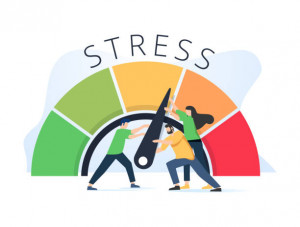There are a few different ways you think about stress. Let’s clear them up:
- Pressure or tension exerted on a material object
- A state of mental or emotional strain or tension resulting from adverse or demanding circumstances
Pressure or tension – what does this mean? Have you ever heard of the phrase ‘if you don’t use it, you will lose it’ – Generally when talking about your muscles. Lifting weights at the gym constitutes pressure on a material object (your body!). Your muscles are placed under a state of stress and over time, get bigger. Sounds pretty good! Apply this concept to all parts of life: muscle strength, cardiovascular health, ability to learn. Stress allows your body to adapt. What about to much stress? This is when injury or overload is more likely to occur. Too much stress can also be perceived as a threat or potential damage, of which your brain becomes aware of, and can interpret this as pain. This is when too much stress can be negative.
Mental or emotional strain – This is a vital part of any living organisms’ ability to stay alive. When a life-threating circumstance arrive, stress allows us to run, stay, fight or freeze. Depending on the situation, this could save your life or contribute to dis-ease and poor health. Stress inducing circumstances include stress at work, irritating colleagues, illness, or conflict. Your nervous system and brain control your response – either fight and flight or rest and digest. Fight or flight involves increasing your heart rate and breathing, more blood to your muscles and away from your digestive system and increase your sweating. Rest and digest involve the complete opposite reaction! This is your bodies inbuilt survival mechanism. But your stress response is your decision – are you going to get angry and annoyed that your co-worker is late again? Or are you going to choose that it is out of your control and let it go? Your thoughts and previous experiences help you determine if you NEED to become stressed. You can learn to re-wire your brain by identifying the trigger, appreciate how and why you react, practice reacting in a different way, and then applying this to life. This sounds very straightforward but in practice, is more difficult and easier to forget, and fall back into previous habits.
Chiropractors are specialists in assessing and correcting spinal subluxations. Subluxations are when your spinal joints have less motion, reduced mobility, or function. This reduces how well your nerves and nervous system communicate and relay information to your brain, causing your brain to function poorly. By correcting your subluxations, you will have a better functioning brain and nervous system which could lead to dealing with stress in a more productive way!
Chiropractic care helps your body cope and manage stress better by allowing your body to work at 100%.
